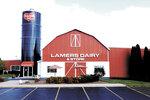


APPLETON, Wis. — As one of the few remaining milk bottling plants in Wisconsin, Lamers Dairy is committed to quality and freshness as well as creating a product with a long shelf life. The company currently processes milk from five local farms as it continues a family tradition started in 1913.
“It’s all about keeping milk local, supporting family farms and putting out the best quality milk possible,” said Mark Lamers, president of Lamers Dairy. “We’re here to serve the community and our local family farmers and try to keep those farmers in business.”
Lamers Dairy, near Appleton, was the second of three stops Oct. 26 on the Professional Dairy Producers Dairy Processor Tours. Known for its nostalgic glass bottles, the dairy promotes the fresh taste of its milk, which goes from cow to bottle within hours.
“Milk comes in and goes right back out,” Lamers said. “Milk bottled today came in fresh yesterday. We are one of only three fluid milk processing plants left in the state and represent one-half of 1% of fluid milk on the market. The challenge right now is servicing that fluid market because of the number of plants that have closed.”
The five farms that Lamers Dairy picks up milk from are located within 30 miles of the plant. Their largest farm milks 200 cows.
“We expect a lot from our farmers,” Lamers said. “We pay them for the cleanest milk possible. The lower their plate count and the cleaner their milk, the higher the premium they get paid. For what we do, it’s critical that our product be better than our competition.”
Currently run by the fifth generation, this family-owned business has grown in production capacity and distribution strength. Lamers’ great-grandfather started the operation on the family’s original farm. They bottled milk in the basement of their home, and the kids distributed it on their way to school.
In the 1930s, the business moved from the farm to a building in Kimberly where the family lived above the dairy plant. In 1998, they began construction on their current facility after outgrowing that space.
“We got back into glass half-gallon bottles when we moved here,” Lamers said. “We had gone away from that for quite some time.”
Today, glass bottles make up 28% of the dairy’s volume. Lamers Dairy believes that glass bottled milk tastes fresher, stays colder longer and is an environmentally friendly option for consumers. Furthermore, selling milk in a glass returnable bottle helps the dairy from a sustainability standpoint. The family purchases glass bottles from a company in Canada, and customers pay a $2 bottle deposit.
“The bottle does not end up in a landfill, and when we can reuse that bottle, we cut our costs in half,” Lamers said.
Lamers Dairy packages around 10,000 gallons of milk per day. Lamers said their quality objectives start on the farm.
“We do a lot of different things to ensure the quality of the milk coming into the plant,” Lamers said. “If it’s not a good product coming in off the farm, we can’t continue to produce a good product.”
At the plant, milk enters one of two silos. Milk then travels through a separator to separate the cream. Afterward, Lamers said, they combine some of the cream back in to provide the butterfat percentage needed for the product they are running. A solids concentration monitor shines a beam of light through products to measure the density of milk. Milk then undergoes the maximum pasteurization allowed without destroying the flavor or integrity of the product.
“We can see exactly what’s happening to the milk as it goes through the pasteurizer, which allows us to control butterfat and make sure it’s at the proper level,” Lamers said. “We are a firm believer in that the fewer pumps you have, the better the product. The shearing action can break down product integrity. That’s why we’ve always had a gravity-feed system.”
Lamers Dairy offers whole white, whole chocolate, 2% white, 1% chocolate, 1% white and skim milk. Milk is sold in one-gallon, half-gallon, quart and pint sizes in plastic; half-pints in paper; and half-gallons in glass. The dairy also fills institutional sized packs, ranging from 5-gallon bags up to 275-gallon totes. Lamers Dairy runs a single shift and employs 36 full-time and part-time employees.
Lamers Dairy products are carried by more than 200 retailers in Wisconsin, Iowa, Minnesota and Illinois. The dairy also bottles Kosher milk one day a week, which is sent to larger markets like Detroit, Chicago, Minneapolis and St. Louis.
In addition, Lamers Dairy sells its products at their on-site country store that visitors enter through the door of a blue Harvestore silo. A variety of Wisconsin-made brands and products and soft-serve ice cream are also available at the store.
During the tour, Lamers urged farmers to learn how their processor prices milk.
“If you’re not getting the minimum blend price, you should be,” Lamers said. “I encourage you to get to know how your milk is being priced.”
Lamers has compassion for the dairy farmer and wants to help them succeed.
“I feel for farmers,” Lamers said. “I really do. With our premium structure, we try to help the farmer. We also have minimal hauling charges. We lose money on that, but we’re supporting the farmers. It’s part of our quality program.”
To stay in business, Lamers said they rely on a good-quality product sourced locally and try to minimize costs the best they can. They also benefit from capturing more margin on certain products, such as small, single-serve packages.
A survivor in Wisconsin’s milk bottling world, Lamers credits a portion of the company’s success to its modest size.
“We’re here to support the family farm,” he said. “We want to return a good living to the farmer and help them live a good life. Sometimes, when you’re real big, that’s hard to do.”
Comments
No comments on this item Please log in to comment by clicking here